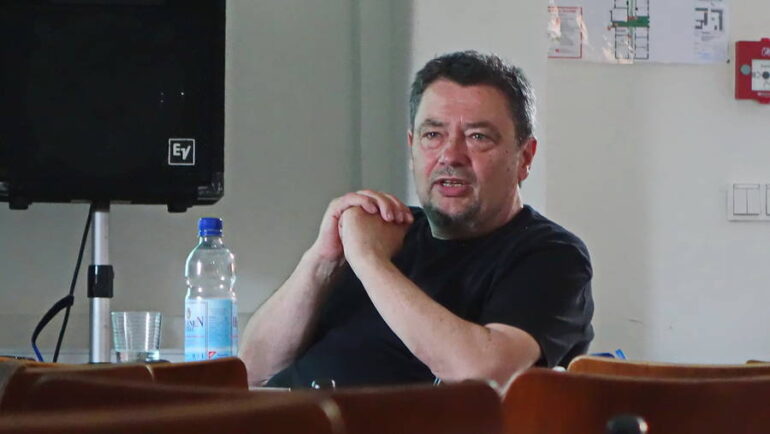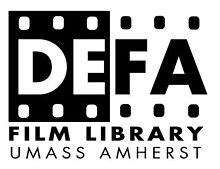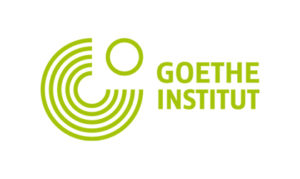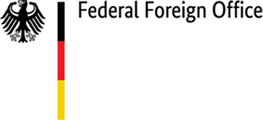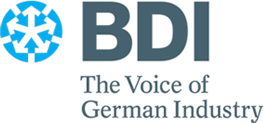Thanks to funding from the Deutschlandjahr project, the DEFA Film Library will bring filmmaker and artist Lutz Dammbeck to the U.S. in the fall of 2019. They will show Dammbeck’s experimental short films as part of Arts Night at German Studies Association Confernce (GSA) and two of his films will be showing during the Portland German Film Festival 2019.
Now 70, Dammbeck—who left the GDR in 1986—is a thought-provoking and productive multimedia artist with decades of work to his name. Most recently, Dammbeck has become best known for two incisive full-length documentaries that critically delve into contemporary issues:
- Das Netz – Unabomber, LSD und Internet (2004) — Käthe Kollwitz Prize of Berlin’s Academy of the Arts
This film explores the history of the creation of the internet in relation to contemporary art and lifestyles. He contrasts this cluster of cultural phenomena to the paranoid and technophobic motives of the Unabomber, Ted Kaczynski.
- Overgames (2015) — Goethe-Institut Documentary Film Prize at DOK-Leipzig
Here the overarching questions have to do with the psychiatric roots of game shows and to what extent games impact people’s behavior. Starting with the recollections of Joachim Fuchsberger, the host of a 1960s West German game show—and his claim that the FRG was a ”crazy, psychologically disturbed nation”—Dammbeck delves into a wide range of gameshows, interviewing a range of people including people involved in creating them.
Biography:
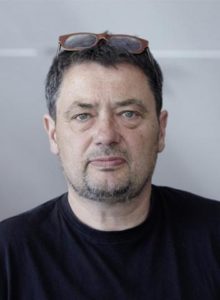 Painter, media artist, filmmaker and producer Lutz Dammbeck was born in Leipzig in 1948. From 1965 to 1967, he took evening classes at Leipzig’s Hochschule für Grafik und Buchkunst (HGB, Academy for Graphic Art and Book Design) before studying full-time at the HGB from 1967 to 1972. While still a student, he started working with animation and submitted ideas for films to East Germany’s state-run DEFA Studio for Animation Film.
Painter, media artist, filmmaker and producer Lutz Dammbeck was born in Leipzig in 1948. From 1965 to 1967, he took evening classes at Leipzig’s Hochschule für Grafik und Buchkunst (HGB, Academy for Graphic Art and Book Design) before studying full-time at the HGB from 1967 to 1972. While still a student, he started working with animation and submitted ideas for films to East Germany’s state-run DEFA Studio for Animation Film.
After completing his military service, Dammbeck became a freelance painter and graphic artist in Leipzig and, in 1975-76, produced his first DEFA animated film, Der Mond. He directed five more remarkable short animation films for DEFA as a freelancer. One of these was Der Schneider von Ulm, an adaption of Brecht’s poem about a tailor who rebels against officials, which he made at the invitation of legendary animator Kurt Weiler. Later in his career, Dammbeck directed one more animation film; produced for television in 1993, the children’s film Herzog Ernst, based on a medieval legend, tells the story of the first crusade and a brave knight who wins the heart of a princess.
Starting in the 1970s, Dammbeck also worked on his own Super-8, 35mm and video projects, including Metamorphosen I—one of the first experimental films to be shown publicly in the GDR—and Hommage à La Sarraz, both of which make use of non-camera animation. These two films were the beginning of Dammbeck’s long-term art project the Herakles-Konzept (Hercules Concept), which the artist sees as a total artwork (Gesamtkunstwerk), which includes research materials, media collages, photographs, texts, painting, dance, film and music. The artist has continued to work on various sequences for and variations on his Hercules project ever since. In 1986, he added REALFilm—one of his filmed multimedia collages, developed in collaboration with dancer Fine Kwiatkowski and other artists, which combined film, dance, painting, music and acting elements. The experimental film Herakles Höhle and the filmed multimedia performances Herakles and La Sarraz are also part of the Hercules Concept project, which is complemented by herakleskonzept.de, a website curated and designed by Dammbeck.
In the GDR, Lutz Dammbeck co-organized two groundbreaking exhibitions, designed to offer an alternative to state-organized art shows. In 1977, he helped developed the concept for an intermedia exhibition called Tangenten I (Tangents I), which was banned in 1978 and never took place. Metamorphosen I is an experimental film collage that was planned to be part of the exhibition. With five other young Leipzig artists, he then opened the 1. Leipziger Herbstsalon (First Leipzig Autumn Salon) in fall 1984; again, the private exhibition met with the criticism and disapproval of officials. The short film fragment 1. Leipziger Herbstsalon shows original footage of the exhibition filmed by cinematographer Thomas Plenert, who also collaborated with Dammbeck on other productions.
In 1986, after many obstacles and official interference in his work, Dammbeck and his family moved to Hamburg, West Germany, where he continued working on the Hercules Concept. It was two years before he started on his next film, Der Maler kam aus fremden Land, which explores his own move to West Germany and that of other artists. In 1990, he founded his own production company and made his first self-produced film, Herakles Höhle.
In the early 1990s, Dammbeck began creating full-length documentaries. These are complex, well-researched, philosophical works that treat the topics of art, power, radicalism and science. Zeit der Götter, centered on German sculptor Arno Breker, presents an in-depth exploration of the role and responsibility of artists during the Nazi era. Das Meisterspiel—which won the Silver Dove at the Leipzig International Festival for Documentary Film—is a detailed search for the true story behind the overpainting of works by Austrian artist Arnulf Rainer and explores the connections between political terrorism and attacks on art. His 2004 documentary about the creation of the internet, Das Netz—for which Dammbeck received the European Media Art Festival Award—investigates the effects of modern technology on the masses; and his Overgames presents a brilliant examination of the history and influence of television—and, in particular, game shows—as a vehicle for mind control and manipulation. In his latest work, Bruno & Bettina, Dammbeck once again explores the relationship between art, revolution and terrorism; it is structured around an interview with the 80-year-old Japanese scriptwriter and director Masao Adachi, which follows his early success as a filmmaker in Japan, his decades-long commitment to the political guerrilla cause in the Middle East, and his eventual return to his artistic career.
Not unrelated to such major documentaries, Dammbeck has created several series of paintings and art installations that have been shown at prestigious venues, including LACMA Los Angeles, Kunstmuseum Bern, International Paik Center Seoul, Hamburger Bahnhof, Nationalgalerie Berlin, Kunst-Werke Berlin, Hamburger Kunsthalle, Schirn Kunsthalle Frankfurt Main, Bauhaus Dessau and Museum der bildenden Künste in Leipzig. Dammbeck also has taught, for example at the Fachschule für Gestaltung (School for Design) in Hamburg (1992-93) and at the Hochschule für bildende Künste (Academy for Visual Arts) in Dresden (2000-14).
Lutz Dammbeck’s film materials, sketches, drawings and documents are archived at the Academy of Arts in Berlin as well as at other important archives, including at the Filmmuseum Potsdam, Stiftung Deutsche Kinemathek, Zentrum für Kunst und Medien in Karlsruhe and the Zentrum für Künstlerpublikationen at the Weserburg Museum für moderne Kunst in Bremen.
Awards:
| 2018 | Hommage à La Sarraz, Underground und Improvisation. Alternative Musik und Kunst nach 1968. Akademie der Künste, Berlin |
| 2018 | Umrisse der Macht|Outline of Power: Werkschau Lutz Dammbeck, Retrospective, Leipzig International Festival for Documentary Film |
| 2018 | Grimme Award nominee, for Overgames |
| 2015 | Goethe Award, Leipzig Festival for Documentary Film, for Overgames |
| 2010 | Lutz Dammbeck. Re-Re-Education, Retrospective, Sprengel Museum, Hanover, Germany |
| 2005 | Prize in Support of German Film Art, DEFA Foundation, Berlin |
| 2005 | Käthe Kollwitz Award for Lifetime Achievement, Academy of Arts, Berlin |
| 2004 | European Media Art Festival Award, for Das Netz |
| 1999 | Wilhelm-Dieterle Film Award, Ernst Bloch Center Ludwigshafen, for Das Meisterspiel |
| 1998 | Silver Dove, Leipzig International Festival for Documentary Film, for Das Meisterspiel |
| 1995 | Prix Danube, Film Festival Bratislava, Slovakia, for Herzog Ernst |
| 1993 | Zeit der Götter, 43rd Berlin International Film Festival |
| 1985 | Golden Sparrow, 4th National Children´s Film Festival Gera, GDR, for Die Entdeckung |
| 1980 | Der Schneider von Ulm, Competition, Oberhausen Festival for Short Films (West Germany) |
| 1977 | Official Selection, Annecy International Animation Film Festival (France), for Der Mond |
Filmography:
| 2018 | Bruno & Bettina (doc.) |
| 2015 | Overgames (doc.) |
| 2009 | Seek II (doc.) |
| 2004 | Die Temporäre Autonome Zone. Hakim Bey (The Temporary Autonomous Zone: Hakim Bey, doc.) |
| 2004 | Besuch bei Rudolf Arnheim (Visit with Rudolf Arnheim, doc.) |
| 2004 | Das Netz – Unabomber, LSD und Internet (The Net, TV, doc.) |
| 1998 | Das Meisterspiel (The Master Game, TV, doc.) |
| 1996 | Dürers Erben (Dürer’s Heirs, TV, doc.) |
| 1994 | Der Reeperbahnmaler (The Painter of the Reeperbahn, TV, doc.) |
| 1993 | Herzog Ernst (Duke Ernst, TV) |
| 1992 | Zeit der Götter (Time of the Gods, doc.) |
| 1990 | Herakles Höhle(Hercules Cave, experimental film) |
| 1988 | Der Maler kam aus fremden Land (The Painter Came from a Foreign Land, TV, doc.) |
| 1986 | Die Flut (The Flood, anim.) |
| 1986 | REALFilm (media collage, Leipzig Haus der Volkskunst on May 14, 1986, documentation) |
| 1985 | Herakles (Hercules, media collage, Galerie Oben in Karl-Marx-Stadt, on February 27, 1985, documentation) |
| 1984-2008 | 1. Leipziger Herbstsalon (First Leipzig Autumn Salon, doc.) |
| 1984 | La Sarraz (media performance, Klubhaus Nationale Front, Leipzig, on June 24, 1984) |
| 1984 | Herakles (Hercules, video) |
| 1983 | Die Entdeckung(The Discovery, anim.) |
| 1982 | Das Luftschiff(The Airship, non-camera anim.) |
| 1981 | Hommage à La Sarraz(Homage to La Sarraz, experimental film) |
| 1981 | Einmart(anim.) |
| 1979 | Der Schneider von Ulm (The Tailor of Ulm, anim.) |
| 1978-79 | Metamorphosen I(Metamorphoses I, experimental film) |
| 1978 | Lebe!(Live!, anim.) |
| 1975 | Der Mond (The Moon, anim.) |
Director and Media artist Lutz Dammbeck in Portland – Program
Thurs., Oct 3 | 8:00 – 9:00 pm | GSA Arts Night
Three early, experimental short films by Lutz Dammbeck
Intro by Seth Howes (Univ. of Missouri) and Q&A with the director
Fri., Oct 4 | 3:00 – 5:30pm | 10 th Portland German Film Festival
Cinema 21, 616 NW 21 st Ave, Portland OR 97209
The Net (Germany, 2003, 121 min., b&w/color, doc., EN ST)
A film about 20 th -century thinkers, increasing technologization and the Unabomber
Intro by Yvonne Behrens (PGFF Director) and Q&A with the director
Sat., October 5 | 9:00 – 11:00 pm | 10 th Portland German Film Festival
Cinema 21, 616 NW 21 st Ave, Portland OR 97209
Bruno & Bettina (Germany, 2018, 105 min., b&w/color, doc., EN ST) West Coast Premiere!
An intriguing interview with filmmaker and former Japanese Red Army member Masao Adachi
on postwar Japan, art, revolution, terrorism and the failure of far-left ideas after 1968.
Intro by Seth Howes and Q&A with the director
© The DEFA Film Library at UMass Amherst

